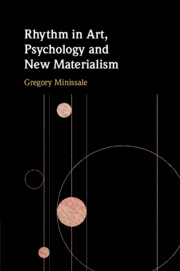Book contents
- Rhythm in Art, Psychology and New Materialism
- Rhythm in Art, Psychology and New Materialism
- Copyright page
- Dedication
- Contents
- Figures
- Acknowledgements
- Introduction: A Rhythmanalysis of Art
- Part I Rhythms of Mind and Matter
- Part II Rhythms of the Brain and Matter Outside of It
- Part III Rhythm, Dirt, Art
- References
- Index
- Plate Section (PDF Only)
Introduction: A Rhythmanalysis of Art
Published online by Cambridge University Press: 25 February 2021
- Rhythm in Art, Psychology and New Materialism
- Rhythm in Art, Psychology and New Materialism
- Copyright page
- Dedication
- Contents
- Figures
- Acknowledgements
- Introduction: A Rhythmanalysis of Art
- Part I Rhythms of Mind and Matter
- Part II Rhythms of the Brain and Matter Outside of It
- Part III Rhythm, Dirt, Art
- References
- Index
- Plate Section (PDF Only)
Summary
We overlook the hairline fractures in the sheen of an oil painting in order to exchange glances with a long-deceased personage. Inconvenient truths are barely registered: a ridge of impasto collects dust, an uncertain light on the surface moves as we move, briefly exposing the warp and weft of the canvas. To focus on humble materials would only remind us that the silk, hair and flesh, the mind and soul depicted, are bits of stuff slowly decaying. Several centuries of practice have turned this habit of overlooking matter into a fine art: the image prevails over its worthless material substrate.
Why do we overlook matter in this way and what happens when we don’t? This is one of the key questions I pursue in this book. An answer to the first part of this question is that for many centuries it seemed a natural function of art to express eternal ideals – the divine, the soul, the mind, order and harmony, and other immutable truths.
- Type
- Chapter
- Information
- Rhythm in Art, Psychology and New Materialism , pp. 1 - 35Publisher: Cambridge University PressPrint publication year: 2021

